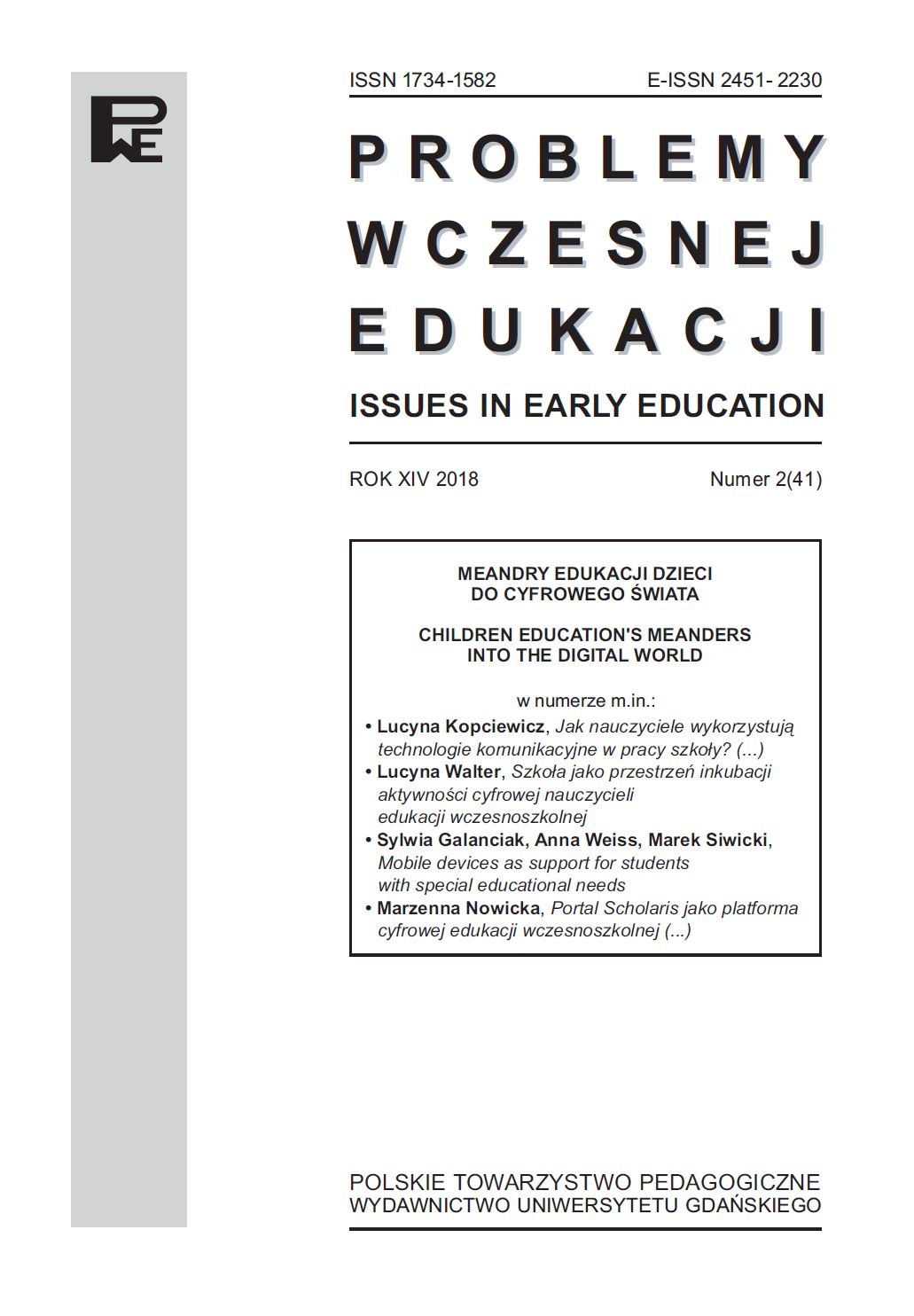Mobile devices as support for students with special educational needs
DOI:
https://doi.org/10.26881/pwe.2018.41.03Słowa kluczowe:
technologie mobilne, specjalne potrzeby edukacyjne, dydaktyka cyfrowaAbstrakt
The article presents partial results of research conducted among forty eight teachers from four European countries, using tablets to work with students with special educational needs (SENs). The aim of the research was to recognize the scope of application of mobile technologies by teachers and also their opinions on the usefulness of these technologies as support in the process of education and rehabilitation. Despite a small group of respondents, the method of a survey (questionnaire) was used due to the ease of obtaining a precise translation of the questionnaire and the results of the research. The image of teachers emerging from the research is that of pedagogues who realistically assess the advantages and disadvantages of tablets as assisting and training technologies and who try to strengthen the educational opportunities of their pupils without systemic support.
Downloads
Bibliografia
Ayres K.M., Mechling L., Sansosti F.J. (2013), The Use of Mobile Technologies to Assist with Life Skills/Independence of Students with Moderate/Severe Intellectual Disability and/or Autism Spectrum Disorders: Considerations for the Future of School Psychology. “Psychology in the Schools”, 50 (3). DOI: 10.1002/pits.21673, 26.07.2017.
Bednarek J. (2010), Teoretyczne i empiryczne aspekty kształcenia osób niepełnosprawnych przez multimedia. W: Andrzejewska A., Bednarek J. (red.), Osoby niepełnosprawne a media cyfrowe. Warszawa, Wydawnictwo APS.
Bond E. (2014), Childhood, Mobile Technologies and Everyday Experiences. Changing Technologies = Changing Childhood? New York: Palgrave Macmillan.
Douglas K., Wojcik B., & Thompson J.R. (2012), Is There an App for That? “Journal of Special Education Technology”, 27 (2).
Firkowska-Mankiewicz A. (2010), Zmiana paradygmatu w postrzeganiu osoby z niepełnosprawnością intelektualną – od pacjenta do obywatela. W: Andrzejewska A., Bednarek J. (red.), Osoby niepełnosprawne a media cyfrowe. Warszawa, Wydawnictwo APS.
Fox J., Murray C., Warm A. (2003), Conducting research using web-based questionnaires: practical, methodological, and ethical considerations. “International Journal of Social Research Methodology” 6 (2).
Galanciak S., Siwicki M., Czarkowski J. (2017), Na krawędzi. Szkoła przed ekranem. Warszawa, Wydawnictwo APS.
Galanciak S., Weiss A. (2016), Nowe technologie w edukacji – między teorią a praktyką pedagogiczną, W: Tanaś M. (red.), Nastolatki wobec Internetu. Warszawa, NASK. One Place for Special Needs: http://www.oneplaceforspecialneeds.com/main/library_special_ needs_apps.html, 20.06.2017.
Pilch T., Bauman T (2001), Zasady badań pedagogicznych. Strategie ilościowe i jakościowe. Warszawa, Wydawnictwo Akademickie Żak.
Szumski G., Firkowska-Mankiewicz A. (2010), Is Polish Special Education Effective? Academic and Socio-emotional Effects of Schooling in Special, Integrated and Regular Schools. “The New Educational Review”, 1 (20).
Światowa Organizacja Zdrowia (2009), Międzynarodowa Klasyfikacja Funkcjonowania Niepełnosprawności i Zdrowia (ICF). Warszawa, Centrum Systemów Informacyjnych Ochrony Zdrowia.
Tanaś M. (2016), Primum non nocere a internetowa przestrzeń wolności i aktywności nastolatków, W: Tanaś M. (red.), Nastolatki wobec Internetu. Warszawa, NASK.
Tanaś M., Kamieniecki W., Bochenek M., Lange R. (ed.) (2017), Raport z badania Nastolatki 3.0. Warszawa, NASK.
The United States Department of State (2004), Individuals with Disabilities Education Improvement Act. Part B.
Wahaba O. (2017), Kindness boomerang. 365 sposobów jak zmienić świat i siebie. Warszawa, Grupa Wydawnicza Foksal sp. z o.o.
Wapiennik E., Piotrowicz R. (2003), Niepełnosprawny w środowisku lokalnym. Łódź, RCPS.
Williams P., Jamali H.R., Nicholas D. (2006), Using ICT with people with special education needs: what the literature tells us. “Aslib Proceedings”, 58 (4), DOI: 10.1108/00012530610687704, 15.07.2017.
Zaczyński W. (1995), Praca badawcza nauczyciela. Warszawa, Wydawnictwa Szkolne i Pedagogiczne.

 Uniwersyteckie Czasopisma Naukowe
Uniwersyteckie Czasopisma Naukowe





